A Celebration of Excellence in Public Participation:
The IAP2 USA Core Values Awards
What are the IAP2 Core Values Awards?
Each year, IAP2 affiliates around the world recognize leaders in the profession through the IAP2 Core Values Awards. The awards go to projects which best demonstrate IAP2's Core Values and help to raise the bar in the field of public engagement by sharing best practices and inspiring the P2 community to learn from one another.
Competition for the 2025 AP2 USA Core Values Awards offered some outstanding projects. Our appreciation goes to our judges for their challenging work.
Public participation is based on the belief that those who are affected by a decision have a right to be involved in the decision making process.
Congratulations 2025 Core Values Award Winners!
The 2025 IAP2 USA Core Values Awards - presented September 29, 2025 at the North American Conference in San Antonio, Texas.
Core Values Award: General Project and Project of the Year"City of Austin Equity-Based Preservation Plan"
|
With its first preservation plan in 40 years, the City of Austin, Texas aimed to expand its historic preservation policies and programs to be more inclusive, equitable, and effective as the city continues to change (scope). The resulting Equity-Based Preservation Plan responds to explosive population growth coupled with an acute affordability crisis, incorporates national best practices around cultural and community heritage, and invites diverse community representation in new, meaningful ways.
City staff designed a four-year planning process grounded in substantive collaboration with community members, particularly people from communities historically marginalized by public policies (purpose). Public participation was sought to achieve the following objectives:
- Shape municipal historic preservation policies and programs that serve all Austin communities
- Inform community members about the planning process
- Educate people how preservation is relevant to them
- Understand the specific impacts of proposed recommendations on communities
- Generate ideas to inform the Plan’s vision
- Build participant capacity and relationships for plan implementation
- Prioritize recommendations for implementation
With the ultimate decision lying with City Council, City staff embarked on an inclusive planning process by committing to Collaborate, Involve, Consult, and Inform across different project stages. A compensated community Working Group drafted the Equity-Based Preservation Plan with early input from 275 community members, City staff, and organizational representatives; then helped to guide other public engagement efforts, exemplifying the “Shared Responsibility” P2 profile with more than 1,300 dedicated hours. Thousands more Austinites provided feedback on the draft Plan and priorities for implementation as a result of creative, dedicated outreach and engagement.
The final Plan explores how preservation can support a more equitable, inclusive, and sustainable future for everyone. 107 recommendations support 14 goals ranging from stabilizing communities to supporting stewardship of community assets. Recommendations prioritize continuing meaningful engagement and propose tools for preservation to equitably benefit people across the city. Finally, they consider how to better tell Austin’s full, complex story while maintaining a high bar for historic designation.
Key engagement takeaways:
1) Representation matters: The Preservation Plan Working Group included 26 community members who reflect Austin’s racial, ethnic, and geographic diversity. Entrusted with drafting an official City plan, working group members invested considerable trust that the City would use their time well and take their recommendations seriously.
2) People from different backgrounds at the table expand the conversation: Collaborative multi-year Plan development expanded Austin’s preservation community. Working group members came from all over Austin, focus groups included new voices, and public engagement prioritized reaching historically marginalized communities. Staff in 15 City departments and 17 City commissions better understand how their work intersects with preservation. Community members who participated in surveys, focus groups, and events saw their input in the Plan.
3) Inclusive plans build momentum: When people see their thoughts, dreams, and efforts in public decisions, they stay committed. The Plan’s mailing list remains active, with 1,400 people receiving updates and invitations to participate in implementation. As implementation begins, there is a level of community and political support that was unfathomable at the start of the planning process.
|
In 2022, the City embarked on an initiative to reevaluate its approach to public participation and allocate resources to better serve its residents, with a strong focus on engaging younger demographics, and combat the growing challenges of misinformation and gaps in knowledge surrounding municipal processes. With this strategic vision, Durango established a new model that focuses on internal coordination and cross-department collaboration in service of effective, intentional community engagement and ensuring volunteer time is valued and meaningful. The previous structure of boards and commissions in Durango was resource-intensive and ineffective in reaching a broader, more diverse audience. Board members and commissioners were often frustrated by their limited decision-making powers and the constant overlap of funding efforts, leading to inefficiency. The intent of the reconfiguration was not just to move away from an administratively burdensome model of 23 boards with 123 members to a reconfigured structure of 15 boards with 78 members, but to be far more intentional about opportunities for public engagement instead of just assuming the boards and commissions were sufficing. Previously, boards and Commissions were often used in-lieu of a more robust public engagement process on projects. The City of Durango demonstrated its deep commitment to fostering public participation and transparency in its community-led 2024 Strategic Plan, which explicitly identifies having an Engaged and Informed Community as one of six overarching goals. There have been formal and informal initiatives contributing to a palpable shift in the City’s culture surrounding public engagement—instead of narrow, disingenuous feedback opportunities, engagement has become iterative, intentional, and most of all, fun! |
Core Values Award: Respect for Diversity, Inclusion, and Culture "The Virginia School Engagement Project" City of Hampton. Hampton, VA |
The Virginia School Engagement Project was led by the City of Hampton in the West Shell/Greenbriar Neighborhood, adjacent to the City of Newport News. The focus area includes a 13-acre remnant of the original 75-acre campus that once housed the Virginia School for the Deaf, Blind, and Multi-disabled.
This project uniquely combined restorative storytelling, inclusive design, and participatory planning to reimagine a historically segregated campus. It centered the lived experiences of alumni from the Virginia School for the Deaf, Blind, and Multi-disabled and leveraged a partnership with the Hampton History Museum to elevate their voices through permanent exhibits. The integration of ASL interpretation at all major events set a new precedent for accessibility in public engagement in Hampton. The project also reallocated $1.5 million from a controversial land sale into a community-driven reinvestment strategy, turning initial skepticism into collaborative momentum.
Three key outcomes showing impact of public participation and engagement:
- Community-informed investment strategy: $1.5 million in proceeds from the land sale were directed by both resident and alumni input, resulting in a shared vision that includes memorial space, accessible green areas, and safety-focused infrastructure improvements.
- Historic preservation through public partnership: The Hampton History Museum now houses an expanded archive and is developing exhibits that capture the school's story, elevating community memory and legacy.
- Policy shifts and increased city responsiveness: The engagement process surfaced long-unmet infrastructure needs in the surrounding area, leading to the City’s commitment to fund a comprehensive study in 2025 and to reframe how neighborhoods with legacies of disinvestment are served.
Three key engagement takeaways:
- Trauma-informed engagement builds trust: Naming past harms and creating space for storytelling was vital in overcoming community skepticism.
- Accessibility is equity in action: ASL interpretation and multilingual materials expanded participation and honored diverse communication needs.
- Transparency fosters shared ownership: Participants remained engaged when they saw how their input shaped decisions, building a sense of legitimacy and partnership in the process.
Core Values Award: Research Project "County of San Diego Engagement Assessment" County of San Diego. San Diego, CA |
In 2022, the County of San Diego centered community engagement in its operational framework. To better understand the County’s community engagement efforts and identify opportunities for improvement, the County embarked on an exploration to evaluate its engagement practices and needs. The project team quickly realized that, while there are many tools for evaluating engagement, there were few precedents for evaluating organizational readiness to conduct engagement for an enterprise of its size. This process resulted in the development of an evaluation framework with four key aspects – Culture, Capacity, Practice, and Impact – and an equity throughline. Using this framework, the team was able to understand not only the current state of community engagement practices within the County, but also attitudes toward and understanding of community engagement, desired outcomes for community engagement, and needs and priorities for expanding County and staff capacity. Read Submission |
IAP2 USA Core Values Awards Judges |
|
|
|
|
|
|
Dr. Marty Rozelle has 35 years of experience in public policy development, third-party facilitation, process design, and conflict resolution. Read more. |
Lewis Michaelson is a past-president, life member, and licensed trainer for IAP2 and a member of the U.S. Institute for Environmental Conflict Resolution Roster of Neutrals. Read more. |
|
Tiffany Xiong is the Head of Growth & Operations at Imagine Deliver, bringing extensive expertise in community leadership, strategic partnerships, fundraising strategy, and stakeholder engagement. She has dedicated her career to building equitable and inclusive spaces through cross-sector collaborations and amplifying community voices. Her experience in community and campaign organizing, as well as fundraising strategy and execution, has significantly impacted political campaigns, grassroots efforts, and leading cultural and philanthropic organizations. |  Lisa Carlson specializes in collaborative problem solving and consensus building with more than 25 years of experience in the field. She provides meeting facilitation services for diverse governmental and nonprofit organizations seeking resolution of complex and politically sensitive issues such as water quality, health policy, suicide prevention and strategic planning. Lisa has her own consulting firm and is a strategic partner of Engaged Public, a Denver-based public policy strategy firm. |
JoAnn Ortiz is the Community Engagement Coordinator, Capital Metro where she supervises an amazing team in MetroAccess. Working to ensure accessible services for people to continue to live and be part of their community. |




